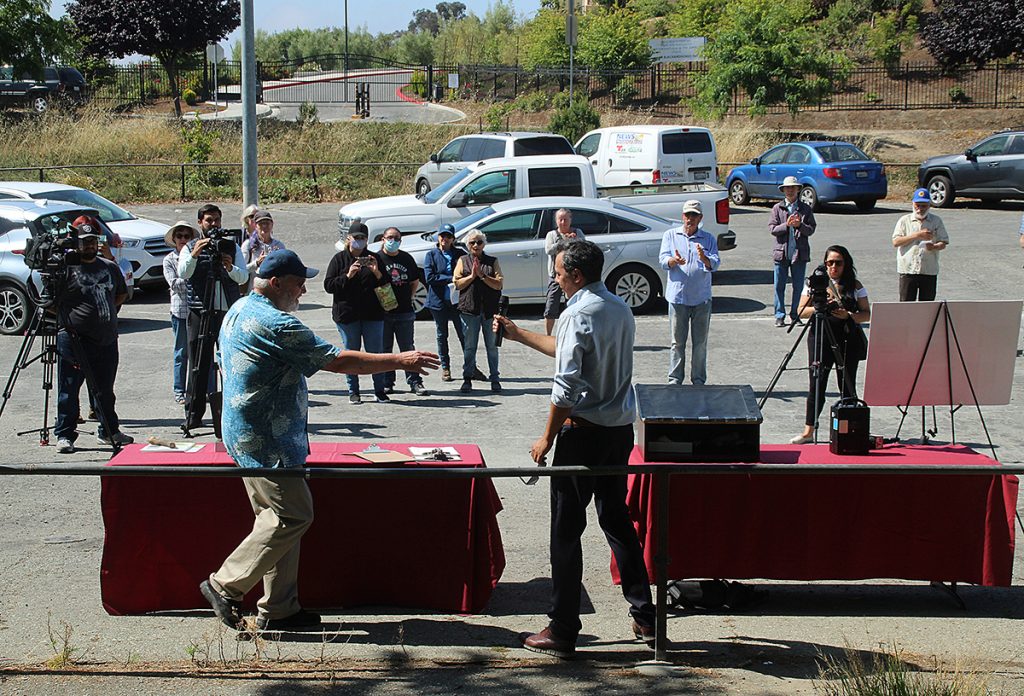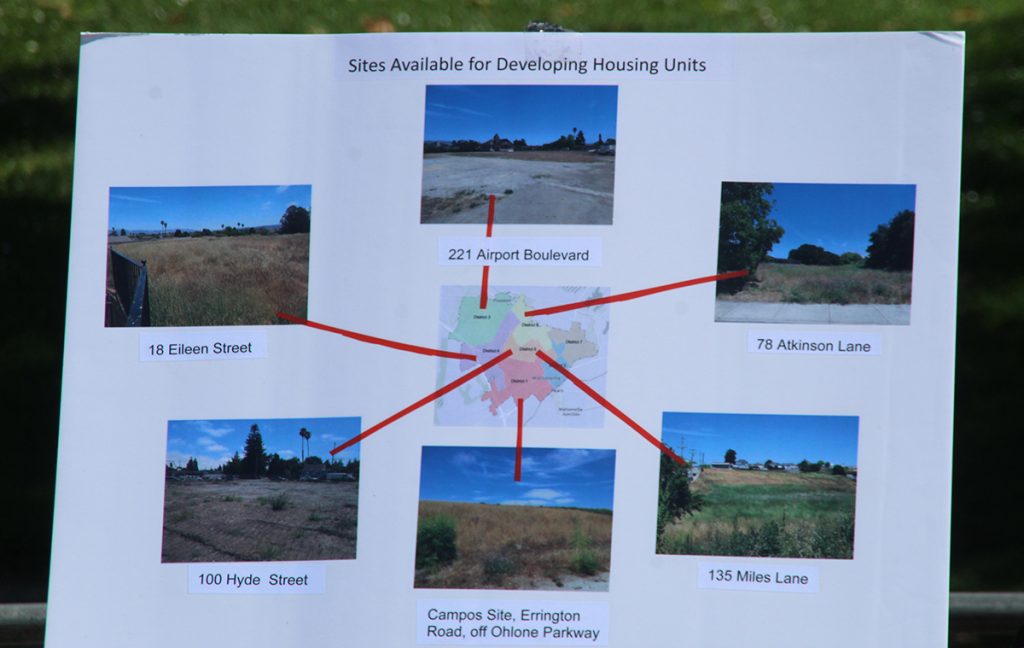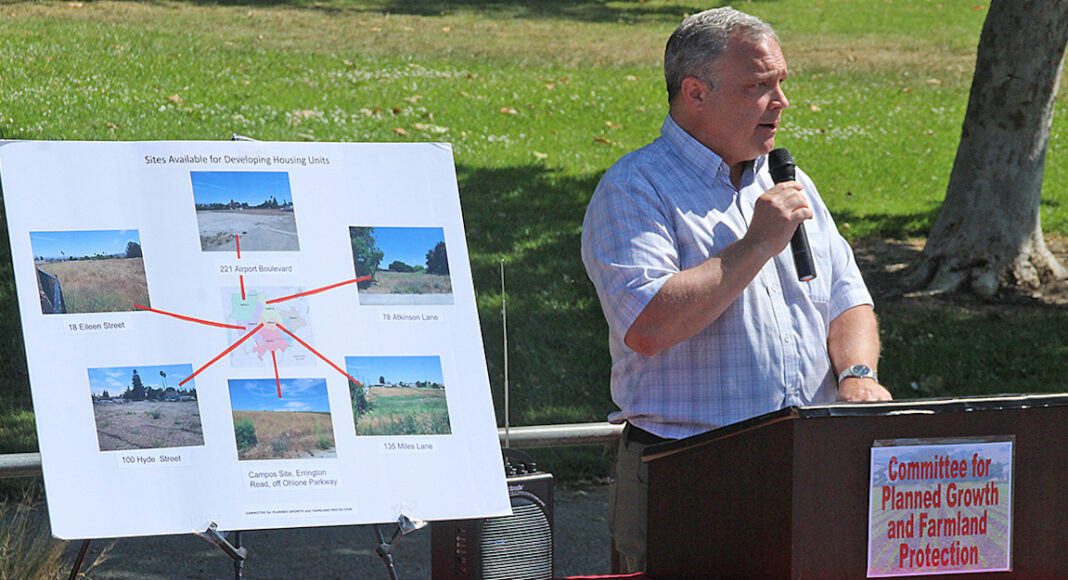A group of about 25 farmers, environmentalists and community leaders gathered at the Watsonville Nature Center on July 8 to officially kick off a campaign to renew a landmark Watsonville ballot measure passed in 2002.
The Committee for Planned Growth and Farmland Protection recently filed a petition to the City Clerk’s office that seeks to extend Measure U through 2040. The measure put limits on where and how the city could expand in an effort to protect the Pajaro Valley’s rich agricultural land and wetlands.
Some of the measure’s limits are set to expire in 2022, and the rest will expire five years later. But the committee wants the city’s urban line limits to stay where they are to limit urban sprawl and encourage developers to renovate blighted areas within city limits.
Committee member Sam Earnshaw in his statements during the July 8 press conference said much of Watsonville wants the same. The farmer turned environmentalist cited a citywide survey in which 95% of respondents said the city should create additional jobs and housing near already existing infrastructure to help preserve natural and agricultural land.
“City residents don‘t want more traffic and sprawl, they don’t want gentrification or us becoming a bedroom community for Santa Cruz, San Jose, Salinas and Gilroy,” Earnshaw said. “Measure U has served the community well.”
Earnshaw and Co. will have until Dec. 15 to gather the roughly 2,200 signatures—or 10% of Watsonville’s voting body—needed to put the item before voters next November.
Watsonville Wetlands Watch board members Bob Culbertson and Karina Moreno, Santa Cruz County Farm Bureau President Arnett Young and two local farmers also spoke at the July 8 press conference.

Measuring up
Measure U’s roots can be traced back to a public battle over roughly 1,000 acres of farmland and wetlands in the late 1990s.
Environmentalists and farmers fought the city when it tried to expand its sphere of influence to eventually annex properties on the west side of the city so that it could build housing and bring light industrial jobs such as packaging and food processing.
The city was in the midst of housing affordability and unemployment crises after roughly 3,000 jobs, mostly middle-class gigs in the canning industry, were shipped out of the country as a result of the North American Free Trade Agreement’s implementation in 1994. Trying to spark economic growth, the city sought to expand its footprint in the hopes of luring other large employers to replace the blue-collared professions that had fled.
In one instance, according to a news report from 1997, dozens of former farmworkers and cannery workers pleaded to the City Council to annex the land to bring roughly 1,200 new jobs.
“We talk about opportunity through diversity,” one unemployed farm worker said, citing the city’s motto—opportunity through diversity; unity through cooperation. “But for opportunity, we must sacrifice so the economy can grow. We ask the council to move quickly to improve the future for us and our children.”
Environmentalists, however, said the city’s outward expansion, especially to the west of Highway 1, would ultimately lead to urban sprawl and the end of the Pajaro Valley’s place as an agricultural giant.
After nearly two years of meetings and lawsuits, the city’s annexation plans hit a brick wall. But out of that defeat arose Action Pajaro Valley, a nonprofit that brought together government leaders, farming giants, environmentalists and business owners to help create a long-term plan of how Watsonville would grow and meet the myriad of challenges the city then faced.
Former Watsonville City Manager Carlos Palacios, now Santa Cruz County’s administrative officer, and West Marine founder Randy Repass co-chaired Action Pajaro Valley, which received funding from the David and Lucile Packard and James Irvine foundations to conduct a yearlong community visioning process.
The end result was Measure U, an amendment to the city’s 2005 General Plan. In 2002 Watsonville’s voting body approved it with 60% of the vote. It had the support of the City Council, Farm Bureau and Watsonville Wetlands Watch as well as several other county and state agencies.
Game plan
Compromise was at the heart of Measure U, Palacios says. Watsonville would give up most of its annexation plans to the east and west, and would instead focus its efforts to the north in the Buena Vista area. There, roughly 2,200 homes would be built in three phases over 20 years.
In addition, the city would also develop the Manabe-Ow property (then the Manabe-Burgstrom) for industrial use, provide more senior housing on the southeast side of the city by expanding the villages and eventually annex property off Atkinson Lane to build needed affordable housing.
“Everybody [in Action Pajaro Valley] agreed that we needed more housing, we needed more affordable housing,” Palacios said in an interview for this article.
Some of these concessions have been realized today. FedEx currently calls the Manabe-Ow property home, and the senior villages have been built off of Bridge Street. In addition, Pippin Orchards on Atkinson Lane was completed in 2019, setting the stage for further affordable housing developments just behind it.
But Buena Vista has sat undeveloped for the last 20 years thanks, mostly, to land-use restrictions related to nearby Watsonville Municipal Airport that were solidified by a 2010 lawsuit from the Watsonville Pilots Association.
Watsonville City Manager Matt Huffaker said in an email that the development of the Buena Vista area is most likely “no longer feasible” because of this reason.
The city has tried to offset that defeat by instead becoming more densely populated, encouraging housing developers to be innovative and build upward. It is also undergoing a planning process to rezone swaths of downtown so that more units can be built there. But the statewide housing crisis has hit the compact city hard, and housing affordability “is more challenging today than ever,” Huffaker wrote.
If the committee does indeed collect the needed signatures, voters will not only be tasked with determining how the city can address its slice of the statewide housing crisis, but also what the vision for Watsonville—employment, recreation, transportation, just to name a few—will be for the next 20 years.
“The implications of this measure are far reaching and can’t be overstated, it will chart a course for the future of Watsonville for decades to come,” Huffaker wrote.

Moving forward
The Watsonville City Council at its July 6 meeting passed a resolution asking staff to prepare a report about the impact Measure U’s extension would have on the city.
That report will include, among other things, its potential impact on traffic, housing availability and the city’s ability to meet growing state-mandated housing goals. It will also study the extension’s potential impact on attracting and retaining businesses.
It is not clear when the report will be ready.
Most council members were already worried that the conversation around the extension was getting away from them. City Councilwoman Rebecca J. Garcia asked Huffaker to include in the report a study of how the extension would impact “sensitive environmental areas,” but Mayor Jimmy Dutra asked if staff could completely remove that portion from the report “since no one probably wants to pave over any of that.”
“People are going to try to be focusing on our sloughs when that’s not going to be the issue,” Dutra said. “How do we avoid people trying to move the conversation to what it’s not?”
Huffaker, however, ultimately left in the study on the “sensitive environmental areas” but emphasized that the city has no plans to develop over that land.
“They’re zoned to ensure that they’re protected for future generations, so I don’t anticipate that needing a significant amount of review, but it is an element to this so I don’t see any harm in including it,” he said.
City Councilman Eduardo Montesino in his comments called the early call to action from proponents of the extension “propaganda.”
“The word is already out that we’re trying to build on the sloughs,” he said. “We need this report now. We need to put out the facts.”
The Committee for Planned Growth and Farmland Protection is planning to host a launch event at the Slough Brewing Collective on Hangar Way on Friday. For information, visit watsonvilleplannedgrowth.org.













